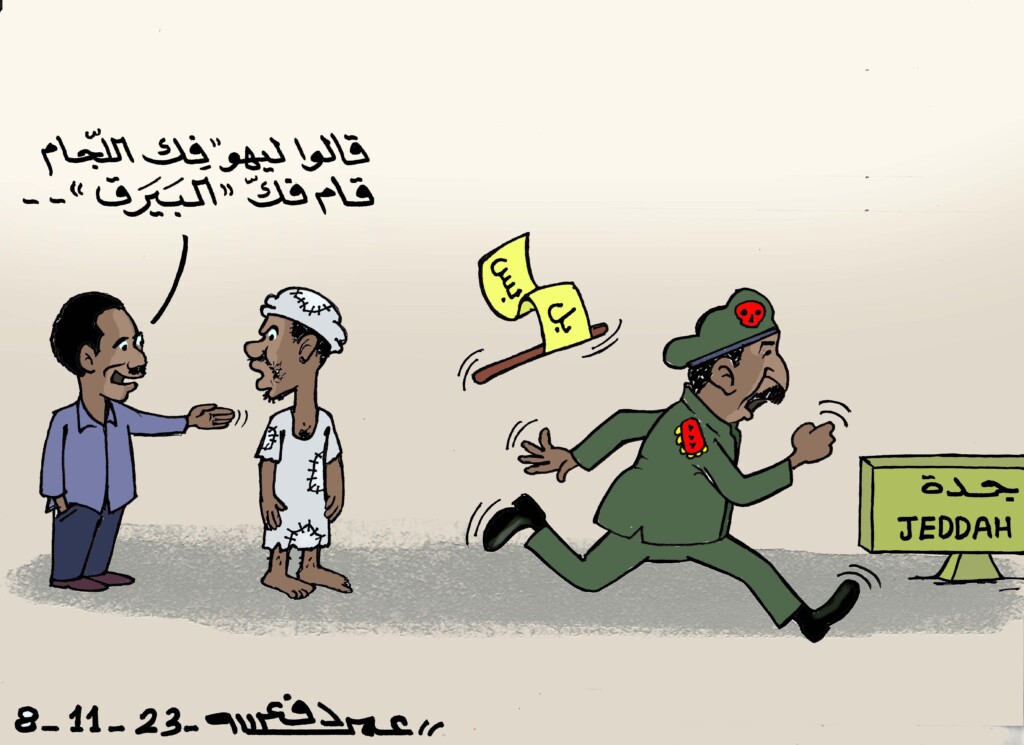Jeddah talks: SAF, RSF agree to facilitate aid delivery, but no ceasefire in sight

SAF Commander-in-Chief Lt Gen Abdelfattah El Burhan accused of abandoning the policy to destroy the RSF, and resort to talks in Jeddah (Cartoon by Omar Dafallah for Radio Dabanga)
The facilitators of the Jeddah negotiation platform have voiced ‘regret’ that the Sudan Armed Forces (SAF) and paramilitary Rapid Support Forces (RSF) have been unable to agree on the implementation of a ceasefire during the first round of talks, however the facilitators confirm that “agreement has been reached on steps to facilitate increased humanitarian assistance and the implementation of confidence-building measures”. The UN humanitarian coordinator in Sudan said in a separate statement that these are “promises that must be kept.”
In a statement published by the Saudi Foreign Ministry yesterday, the facilitators announced the commitment of the army and the RSF to engage in a joint humanitarian mechanism led by the UN Office for the Coordination of Humanitarian Affairs (OCHA) in Sudan, to address obstacles to the delivery of humanitarian aid.
The parties also agreed to identify focal points to facilitate the passage and transit of humanitarian workers and aid.
The statement stressed the agreement of the two parties to implement confidence-building measures regarding the establishment of a communication mechanism between the SAF and RSF commanders of the armed forces, the detention of prison escapees, improving the media content of both parties, reducing the intensity of the media language, as well as taking measures against the parties provoking escalation and fuelling the conflict, provided that these measures are implemented in parallel.
The two parties affirmed their individual commitment to facilitate the passage of humanitarian assistance to both parties and that these commitments represent an important step to facilitate the delivery of humanitarian assistance, which contributes to alleviating the suffering of the Sudanese people, and in this context.
The facilitators stressed in a statement that there is no acceptable military solution to this conflict, noting that they discussed with the parties the need to put the interest of the Sudanese people first, lay down arms, and engage in negotiations to end this conflict.
The UN humanitarian coordinator in Sudan said in a separate statement that “commitments adopted in Jeddah today by the parties to the conflict in Sudan marks a moment of truth for the country. The promises made by the SAF and RSF – to protect civilians and provide unimpeded humanitarian access – are promises that must be kept.”
‘Cautious optimism’
Mustafa Ibrahim, member of the advisory office of the RSF commander, yesterday expressed cautious optimism about the possibility of successful negotiations in Jeddah.
Ibrahim said in remarks to the London-based Arab World News, “We are optimistic for solving the Sudanese problem and for the solution to be comprehensive and does not exclude anyone except the former regime that brought us to this war.”
Ibrahim rejected accusations that the RSF was not serious because it took control of a number of cities in Darfur during the negotiations, adding that “there is no ceasefire until we stop, and the Sudanese army, for its part, has not stopped bombing.”
Regarding the Sudanese army’s demand for the RSF to evacuate homes and civilian objects, Ibrahim denied that paramilitaries have taken residence in homes of people in Khartoum. “This is a false allegation by the Sudanese army, with which it wants to disrupt these negotiations,” he said.
RSF members themselves posted footage of themselves occupying homes in Khartoum during the first months of the war that erupted on April 15.
The advisor to the RSF commander accused the army of causing civilians to flee, adding, “If the army stopped bombing people with air and artillery in their places of residence, they would return to Khartoum, like what happens in the states of Darfur.”
“If the military is not keen on these negotiations, we will not be keen on them,” he said, noting that their agreement to resume talks was “in appreciation of the joint mediation.”











 and then
and then